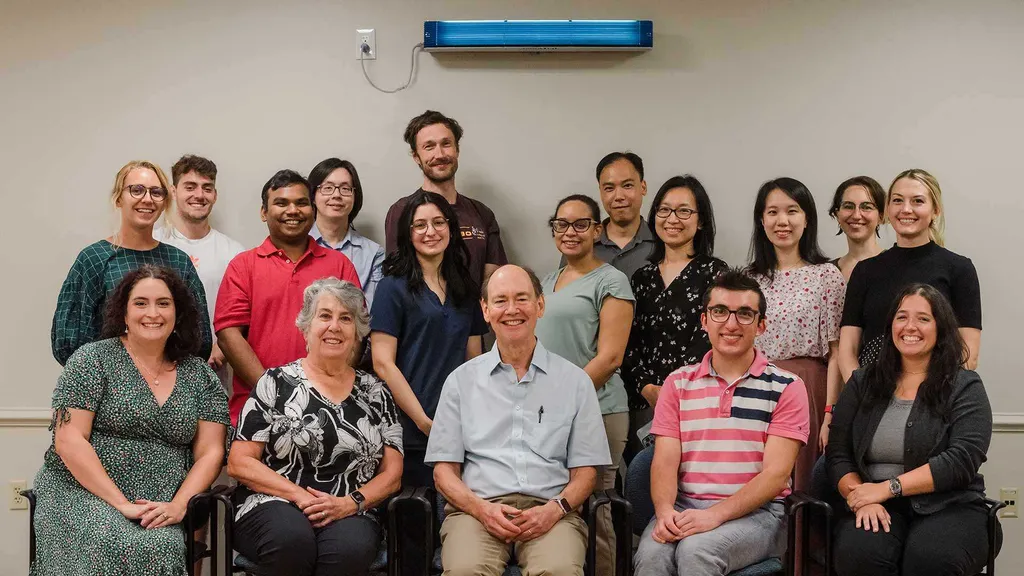- November 01, 2022
- By Kelly Blake
A $9.4 million gift to the University of Maryland will help fund a daring research initiative aimed at creating the next great public health revolution: innovative and affordable systems that provide clean, safe indoor air and prevent the spread of respiratory infections.
Ethereum co-founder Vitalik Buterin’s cryptocurrency gift from his Balvi Filantropic Fund—the largest of its kind to UMD and among the largest crypto donations ever given to a U.S. university—will support the School of Public Health’s research into germicidal ultraviolet light (GUV) led by the Public Health AeroBiology Laboratory (PHAB Lab). Operating with the flip of a switch, the GUV systems could one day be an indispensable and ubiquitous measure to eliminate COVID-19, influenza and other highly contagious pathogens from the air more quickly and effectively than ventilation and filtration alone.
The project is led by Professor Donald K. Milton, M.D., PHAB Lab director and a leading expert in how respiratory viruses are passed between people. His research has provided some of the key evidence that viruses like influenza and SARS-CoV-2 persist in indoor air as tiny particles known as aerosols; the new funding could help further his efforts to demonstrate their centrality in respiratory disease transmission.

Milton in recent years has emerged as one of the most prominent scientific voices backing the use of masks to guard against the spread of COVID-19, and his work was cited by the National Research Council in its April 2020 letter to the White House warning that COVID-19 could spread through breathing and talking. The message, and many of Milton’s findings, contradict long-held beliefs in medicine that harmful viruses spread mainly through relatively large respiratory droplets that quickly fall to the ground.
“The COVID-19 pandemic demonstrated the need to control the spread of respiratory infections without shutting down social and economic activities,” Milton said. “We have the technology to prevent airborne spread of respiratory diseases. But if we are going to use these technologies to control the next pandemic, we must invest in it now, before it starts. This generous gift from Balvi is going to help us lay the groundwork to make that happen.”
The Balvi Filantropic Fund prioritizes quickly deploying funds to high-value COVID projects that traditional, institutional or commercial funding sources tend to overlook for being too early or “outside the box.” Buterin’s recent philanthropy has included gifts to improve the COVID response in India and to support Ukrainian relief efforts as the country contends with a full-scale Russian invasion.
Milton previously installed a special germicidal GUV air disinfection system in his lab to protect people studying flu, and since January 2020, those involved in the PHAB Lab’s StopCOVID study. The devices, common in certain medical environments, are able to “easily and silently kill half of the germs floating in indoor air every two minutes or less,” Milton wrote earlier this year in a New York Times essay—but major obstacles prevent wider deployment of the systems.
This Balvi gift will enable the PHAB Lab team to work to overcome these hurdles through five main efforts:
- A randomized controlled trial conducted with volunteer participants at a Maryland hotel over several years aims to definitively test whether respiratory viruses are spread by aerosols. It’s part of a large study of transmission funded by a $15 million cooperative agreement with the National Institutes of Health. The Balvi gift will enable expansion of the trial to use GUV as well as filtration to study the mode of transmission. “We know that filters remove and UV kills viruses, but is this virus airborne? The big scope of my work is to provide evidence that is definitive, for or against the importance of airborne transmission, that stands up over time and that can be built on to prevent future pandemics,” Milton said.
- Public-attitudes and communications research will aim for acceptance of GUV to clean indoor air, since public perceptions will ultimately determine whether GUV can be implemented successfully on a large scale, Milton said. Keeping in mind how mitigation measures like masks and vaccines became political flashpoints throughout the COVID-19 pandemic, the project will engage SPH health literacy experts and researchers who work in partnership with Black barbershops and hair salons.
- Training and certification of technicians and contractors will address the need for expert installation and maintenance of these systems. The PHAB Lab team will work in conjunction with a team of internationally known GUV safety experts and the interNational Association of Lighting Management Companies to accelerate efforts to develop a training and certification program.
- Optimization of GUV system designs aims to identify the best ways to use UV lights to remove germs effectively, even when the germs come from someone sitting nearby. Researchers will test this capability with bacteriophages, viruses that infect and replicate only in bacterial cells and can be released safely in a room occupied by people.
- A field intervention study, planned to be conducted in collaboration with local Busboys and Poets restaurants, will test how GUV impacts transmission in real-world settings.
"Preventing future pandemics is a grand challenge, and universities have an important role to play," said UMD President Darryll J. Pines. "Our University of Maryland experts are leading research and testing technologies that can impact disease transmission and transform how we respond to the next global health threat."
Giving Through Cryptocurrency
The Balvi Filantropic Fund’s gift to UMD is the largest the University of Maryland has received since accepting cryptocurrencies. UMD partners with the Giving Block to accept cryptocurrency donations, a tax-efficient way to support the university. For more information, contact Tiffanie Purvis in the Office of Gift Planning at tpurvis1@umd.edu or 301.405.4630.
Topics
ResearchUnits
School of Public Health